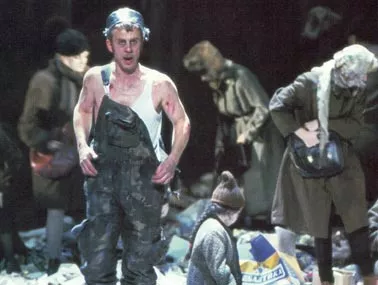BORIS GODUNOW
Opera
The KOMISCHE OPER has a new Boris and it's a stunner: a radical, daring and, in its own terms, wholly valid 'go' at the problematic masterpiece, which does the house's reputation no end of good. What, then, are 'its own terms'? Firstly, the Ur-1869 version, in seven scenes, given without a break. The dramatic effect of this alone is considerable. This is certainly not a production that sprawls, rather one that assaults. Parallel to this is producer Uwe Eric Laufenberg's determination to strip away any notion of a gilded, picture-book past-thank God, no cupolas and pretty cloisters here. He does not actualize the setting so much as continually suffuse past and present into each other, so that various forms of dictatorship and oppression, along with occasional moments of hope or thaw, are blended together, largely by virtue of newsreel film. Nonetheless, the poverty and misery of the people are very much of today. Their miserable rags, the faded gentility of once-good clothes, their plastic shopping bags, their status as beggars and scavengers is in your face. You can imagine how a well-dressed first-night audience (April 29) felt when confronted by this. With Boris, Laufenberg employs stage techniques quite different from his dazzling and homogeneous Ariadne auf Naxos of last season. Now he (and his brilliant designer Christoph Schubiger) are keen to dislocate, to confront us with a variety of images, whether a rubbish-dump thrown contemptuously down onto the stage from the flies, or a tiny but highly realistic inn for Varlaam's scene, or an exquisite birch forest bathed in snow evoking an unsullied world. But throughout it all the shoddy machinations of power and their dreadful consequences for a people not in control of their own destiny is never off the stage.
Still, the 'people' have centre stage in this production so it's good to record another triumph for the Komische Oper chorus, probably the best of the three in Berlin at the moment. These people know what it means to act. They are used to being a major dramatic factor in productions and their stage skills are unequalled in the capital.
This was a remarkable and serious Boris; the bellowing discomfort of the first-night audience (they don't really mind reality on the stage as long as it's pretty- bless them) was essentially a vindication of the Komische Oper's success in presenting fresh and splendid operatic theatre.
Die Welt
Billiger Russen-Pop hämmert aus dem Ghettoblaster, den der angeschmuddelte, debil dreinschauende Punk mit den feuerroten Haaren auf der Schulter trägt. Nein, wir sind nicht in Kreuzberg auf der revolutionären 1.Mai- Demo. Wir sind in der Komischen Oper. Die sich nach zweieinhalb pausenlosen Stunden "Boris Godunow" (man spielt die Fassung von 1869) allerdings in eine Art Trainingscamp für potentielle Demonstranten verwandelt: Lauter, aggressiver schreit kein Autonomer. Weil es ein Sakrileg ist, die Oper in den Popsumpf zu treten? Weil Russland bei Regisseur Uwe Eric Laufenberg ganz wörtlich im Müll versinkt? Weil er eine Gegenwart auf die Bühne stellt, die tagtäglich unbequem über die Bildschirme flimmert?
Allein Jessica Karges Kostüme wirken so echt, als seien sie erst gestern in einem Moskauer Armenviertel geklaut worden. Doch Laufenberg setzt die U-Musik nicht als platte Provokation ein, sondern als Entsprechung für eine entscheidende Ebene in Mussorgskys Musik: das Volkstümliche, den Ton der Masse. (........)
Der Chor singt prächtig und nutzt jede Chance, aus der Masse individuelle Charaktere zu formen, das Orchester spielt unter der Leitung Alexander Anissimov so nuancenreich und gut wie lange nicht mehr.
Laufenbergs genau beobachteter, differenziert entwickelter "Boris" ist Balsam nach den letzten, gründlich missglückten Premieren der Komischen Oper. Auch wenn der ganze Zuschauerraum für die nächste Straßenschlacht übt.
Frankfurter Allgemeine Zeitung
Wenn der Gottesnarr ( Christoph Späth) im vorletzten Bild seinen bitteren Abgesang auf Volk und Zar anstimmt, wendet er ins Hörbare, was er zuvor als omnipräsenter stummer Statist mehrfach schon sichtbar gemacht hatte: die unaufhaltsame Deklassierung der Ärmsten der Ärmsten. Sein Striptease im Schneegestöber zwischen weißen Birkenstämmen wirkte wie ein absurd- schönes Bild für die Sehnsucht nach besserem. Ein Schock der Erkenntnis auch die Poesie des Mülls, der da mit einem Male aus dem Schnürboden fiel und von Volk und Narr hoffnungsvoll durchstöbert wurde. In dem Rascheln, welches Mussorgskys von einfachen Trauersekunden durchwebte Musik grundierte, verwandelte sich unterderhand ein altes Schimpfwort zu einem Schlüsselbegriff: "Mussor" (das heißt "Müll" oder "Schutt") hatte man nach der Uraufführung des "Boris" in der Petersburger Presse gehöhnt, in Anspielung auf den Namen des Komponisten.
Financial Times
The Kremlin is, after all, only a train-ride away from the Brandenburg Gate. Russia`s tragedies are uncomfortunaly close to home, more today than ever before. As the country disintegrates, berlin catches the fall-out- the rich in its exclusive boutiques, the poor in illegal jobs on its countless biulding sites...
This month would have been the 100th birthday of Walter Felsenstein, the director who revolutionised music theatre at the Komische Oper during his long term at its head (1947-1975). A lively and immediate Boris Godunow so much better than most of the house`s recent premieres is a good way to honour the occasion.(...) If the production is too busy, as though the music cannot be trusted to hold the audience`s interest, there`s compensation in the fact that the acting is superb, and the chorus work breathtaking. Despite bemusing moments, the staging is intellectually strong and technically expert, with flashes of genius.
